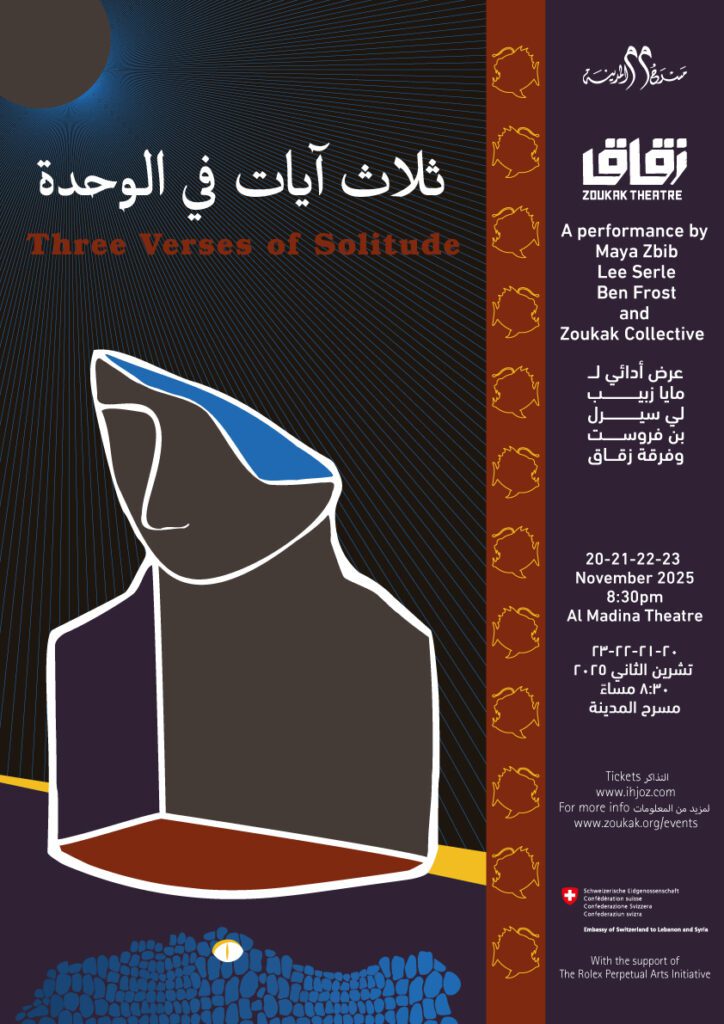In a moment when Lebanon continues to navigate war, displacement, and the weight of daily survival, Three Verses of Solitude opens a rare space: a quiet room where stillness becomes an act of listening, and solitude becomes something shared.
Presented at Al Madina Theatre on November 20–23, the immersive performance brings together director and performer Maya Zbib, choreographer Lee Serle, composer Ben Frost, and the Zoukak Collective to explore the emotional textures of being alone, not as isolation, but as a state where imagination, memory, and connection can briefly coexist. Theatre on November 20–23, the immersive performance brings together director and performer Maya Zbib, choreographer Lee Serle, composer Ben Frost, and the Zoukak Collective to explore the emotional textures of being alone, not as isolation, but as a state where imagination, memory, and connection can briefly coexist.

A meditation on stillness in a time of noise
Inspired by the atmosphere of the Rothko Chapel, the performance refuses spectacle. Instead, it holds space for gentle gestures, slow transitions, and movements shaped by breath.
It traces solitude across different stages of life: the enforced stillness of pandemic confinement, the quiet insistence of early motherhood, and the solitude that settles in after collective loss.
Rather than portraying loneliness as emptiness, the work frames it as a creative and psychological threshold, a place where something vulnerable, and sometimes bold, has room to form.
In a country accustomed to crisis, this reframing feels both intimate and political.
“In the wake of loss, how can we be alone, together?”
That question becomes the performance’s central thread.
The staging invites the audience into small, almost private exchanges: the warmth of shared silence, bodies moving in and out of proximity, the limits of touch, and the sensitivity of listening.
Zbib’s director’s note places motherhood at the heart of this exploration. The difficulty of accessing silence, especially for women whose time and emotional labor are continually claimed, becomes a metaphor for a society struggling to reclaim its interior space.
“How do you immerse yourself in stillness,” she asks, “when everything around you demands noise?”
Collaborative creation as resistance
The piece is devised collectively by Zoukak, Serle, and Frost, a method central to Zoukak’s ethos since its founding in 2006. The collective has long used theatre as a tool of reflection and resistance, developing works that confront memory, power, and marginalization while engaging deeply with community.
Three Verses of Solitude extends that practice by leaning into abstraction. Light, sound, choreography, and text intertwine to form an experience where meaning doesn’t arrive fully shaped — it unfolds gradually, allowing audience members to find their own entry points.
The performance features:
- Lamia Abi Azar
- Junaid Sarieddeen
- Lee Serle
- Maya Zbib
with lighting by James F. Ingalls, scenography by Caspar Pichner, masks by Dima Al Attar, and music by Ben Frost, whose compositions, at times dissonant and at others barely audible, hold the performance’s quiet tension.
A global process with a local heartbeat
The production’s development spanned multiple international residencies, including BAM (New York), Mabou Mines (NYC), and Noorderzon Festival (Groningen), before taking shape in Beirut.
With support from the Rolex Perpetual Arts Initiative and the Swiss Embassy in Lebanon, the work stands at the intersection of global collaboration and local urgency.
Yet at its core, it remains rooted in the Lebanese context: the exhaustion of prolonged crisis, the longing for a moment of release, and the fragile hope embedded in creating together.
Theatre as quiet resistance
In Beirut, where public space is strained and collective anxiety saturates daily life, Three Verses of Solitude reads as a small act of defiance: an hour where slowness is allowed, where silence carries meaning, and where the audience can sit with themselves without feeling alone.
The performance does not offer answers.
Instead, it offers room, for reflection, for estrangement, for brief connection.
In a city shaped by rupture, perhaps that room is enough.


